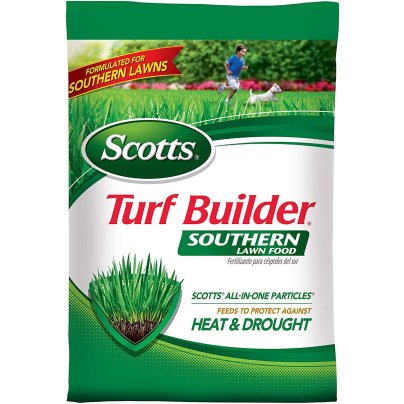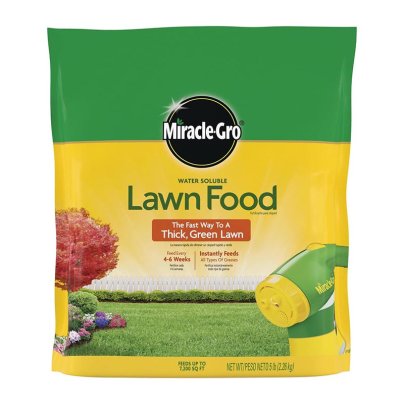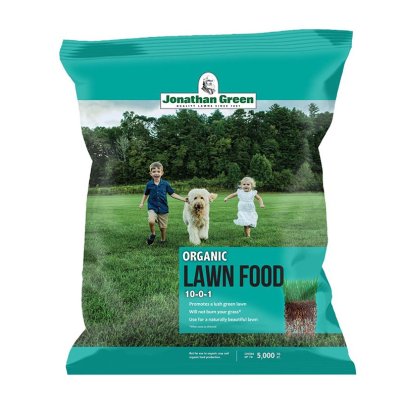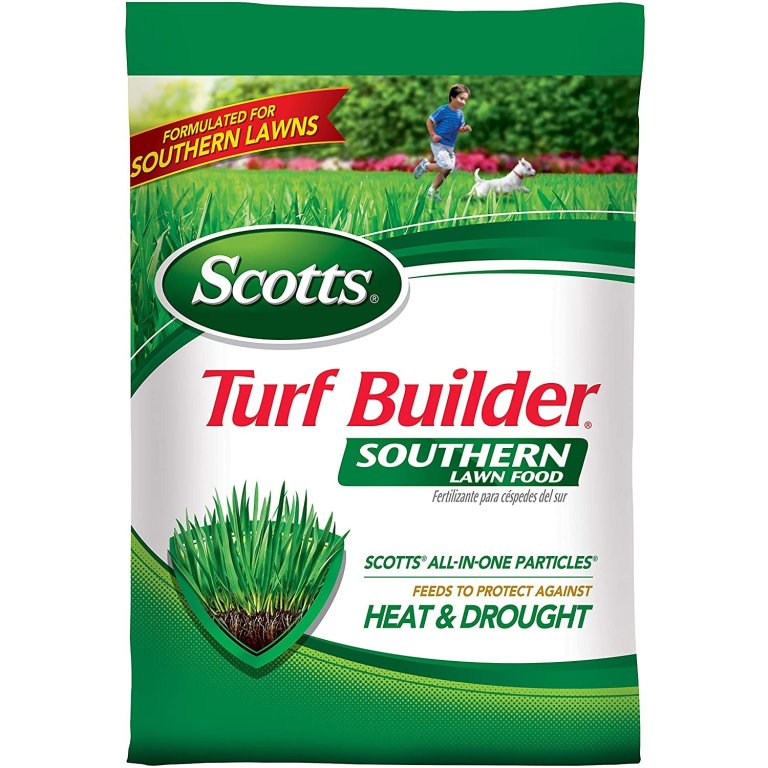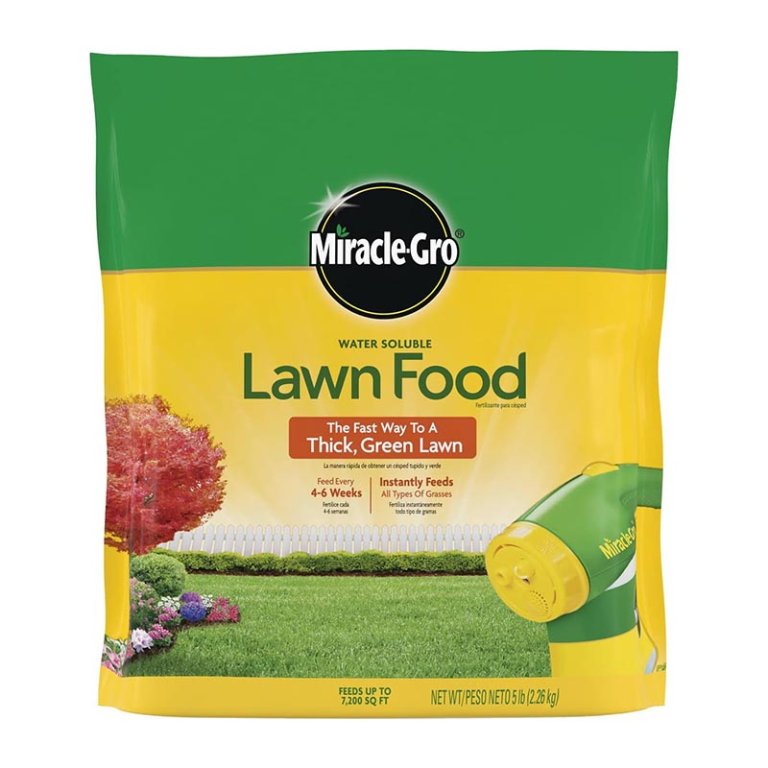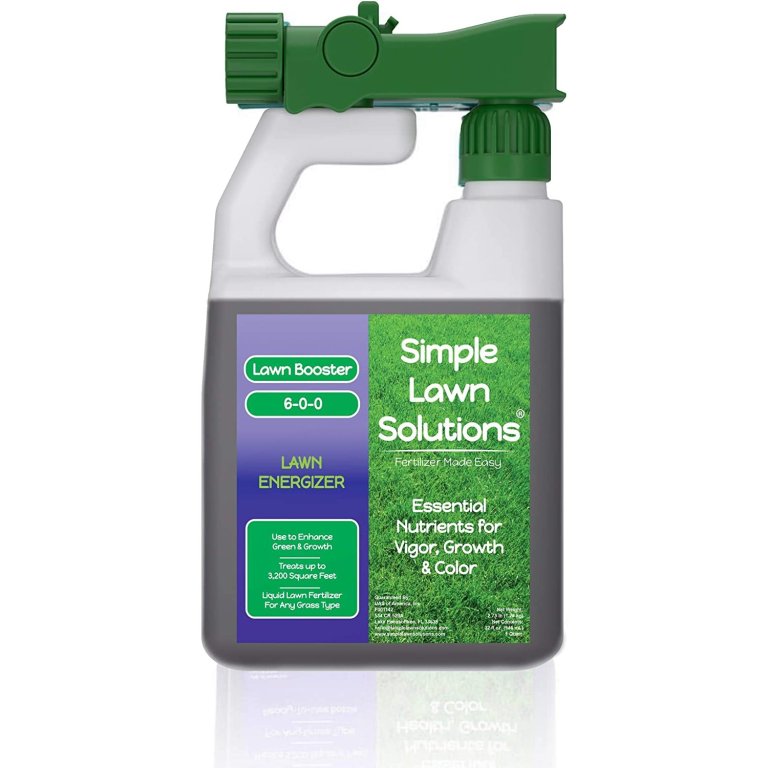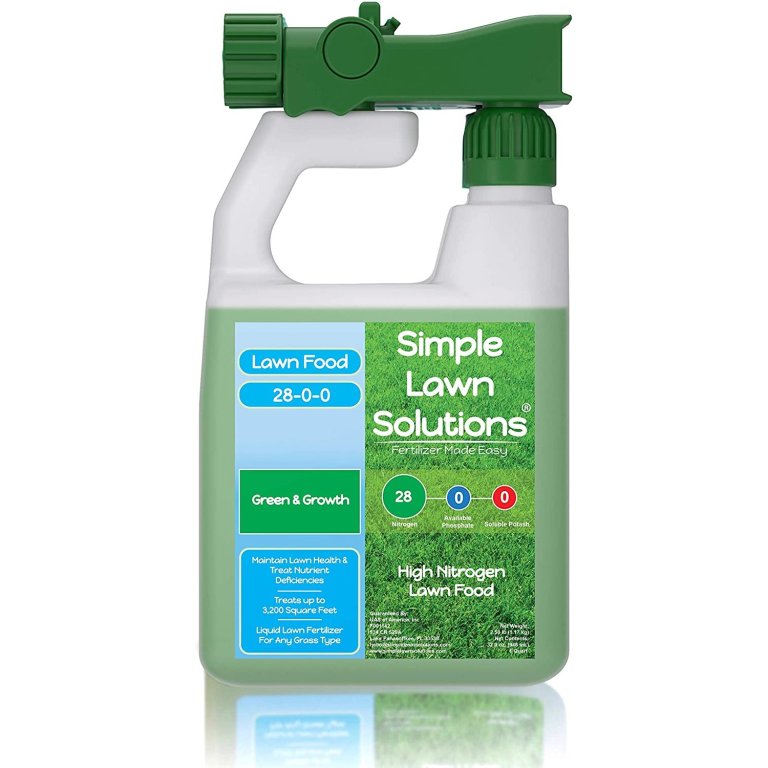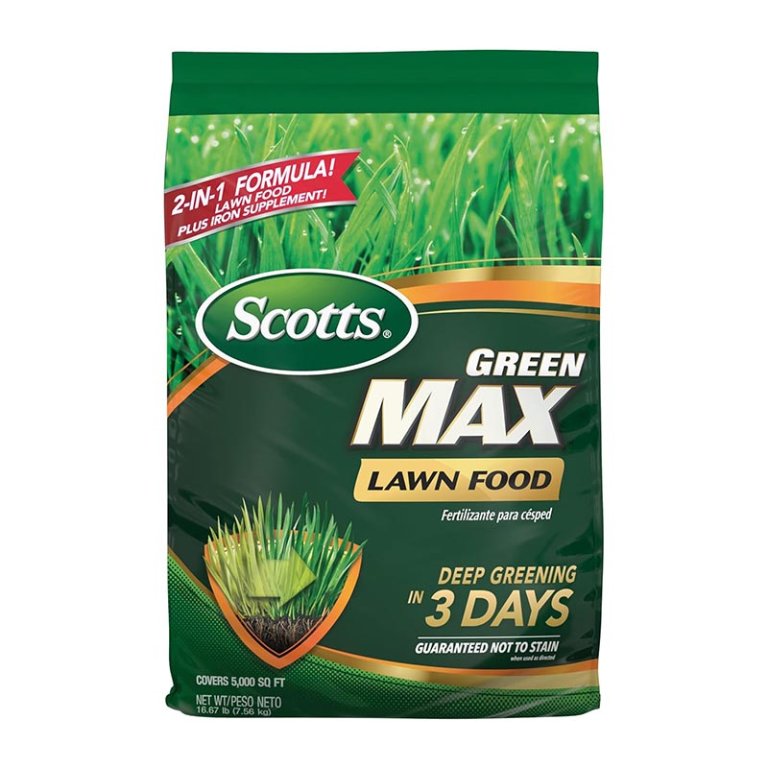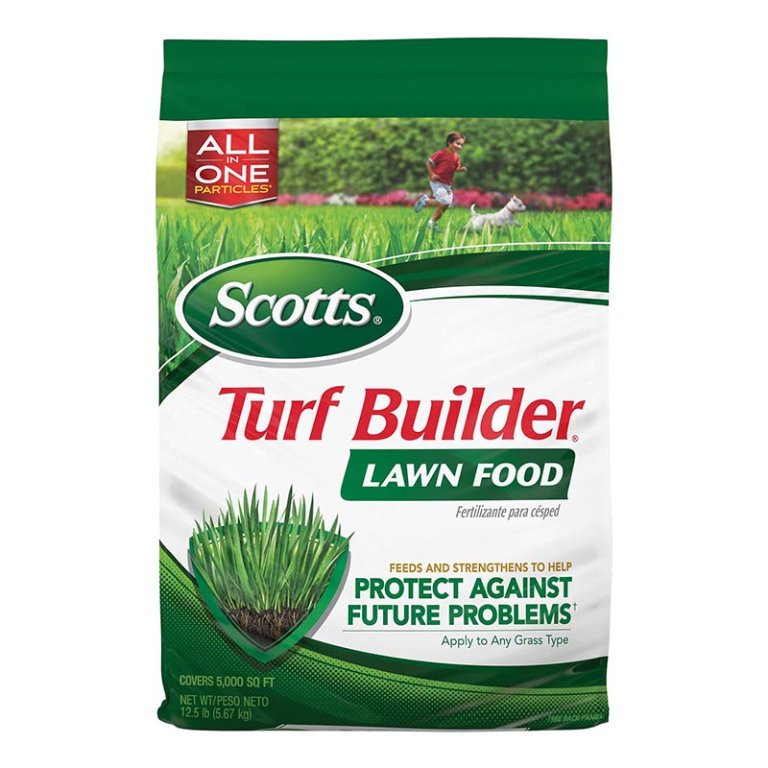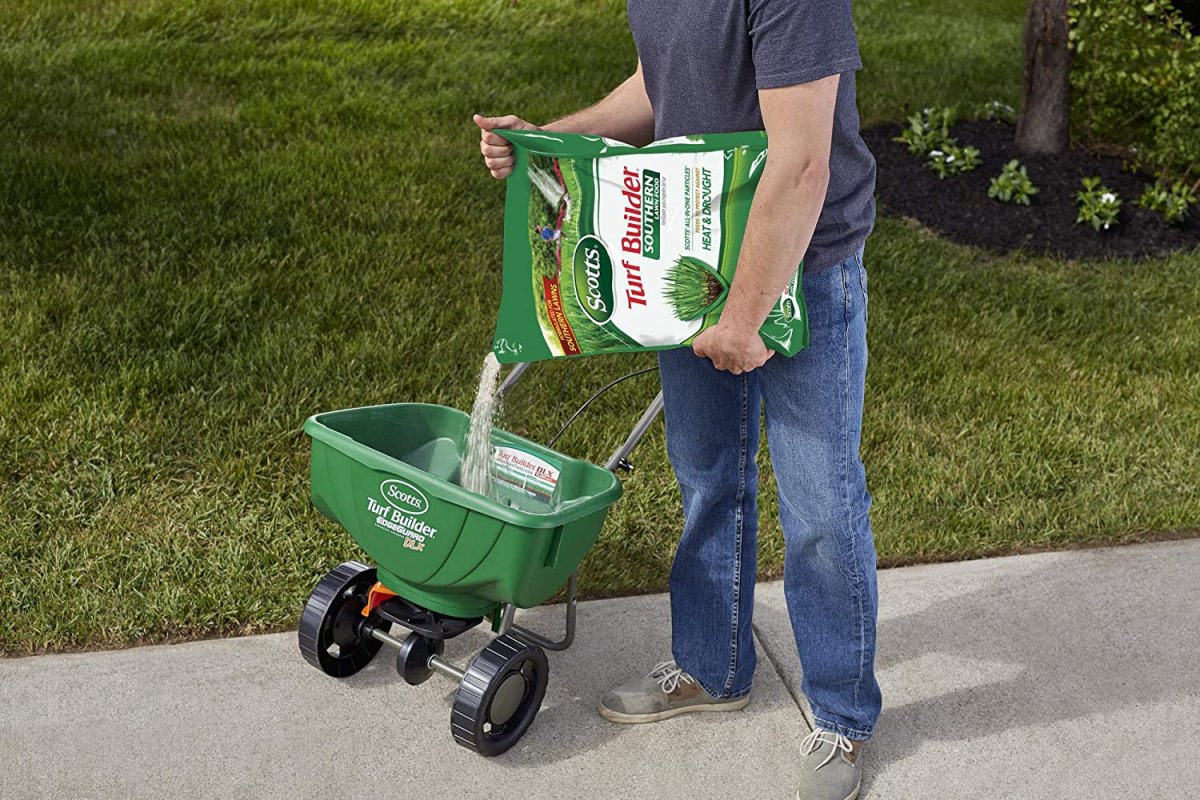
We may earn revenue from the products available on this page and participate in affiliate programs. Learn More ›
Fertilizers for Bermuda grass are high in nitrogen with lower levels of phosphorus and potassium, providing the nutrients this warm-season grass needs to grow into a lush green lawn. Drought tolerant and not picky about the soil in which it grows, Bermuda grass (Cynodon dactylon) is soft yet tough enough to stand up to kids, pets, and other traffic. Though it’s relatively easy to care for, it’s still important to choose the right lawn care products for growing Bermuda grass to ensure a strong and healthy lawn.
To help you select a good fertilizer for Bermuda grass, we spoke to an award-winning landscape contractor and international arborist about which types of fertilizers are best and how to apply them. Based on our research, our top pick is the Scotts Southern Turf Builder Lawn Food—a high-nitrogen fertilizer that enhances nutrient and water absorption. For the healthiest and best-looking lawn, we recommend you review all of our fertilizer recommendations before selecting one of the best fertilizers for Bermuda grass to meet your lawn’s needs.
- BEST OVERALL: Scotts Southern Turf Builder Lawn Food
↓ Jump to Review - BEST BANG FOR THE BUCK: Miracle-Gro Water Soluble Lawn Food
↓ Jump to Review - BEST ORGANIC: Jonathan Green Organic Lawn Food
↓ Jump to Review - BEST LIQUID: Simple Lawn Solutions Energizer Micronutrient Blend
↓ Jump to Review - BEST NITROGEN ONLY: Simple Lawn Solutions High Nitrogen Lawn Food
↓ Jump to Review - BEST FAST-ACTING: Scotts Green Max Lawn Food
↓ Jump to Review - BEST FOR NEW GRASS: Scotts Turf Builder Lawn Food
↓ Jump to Review
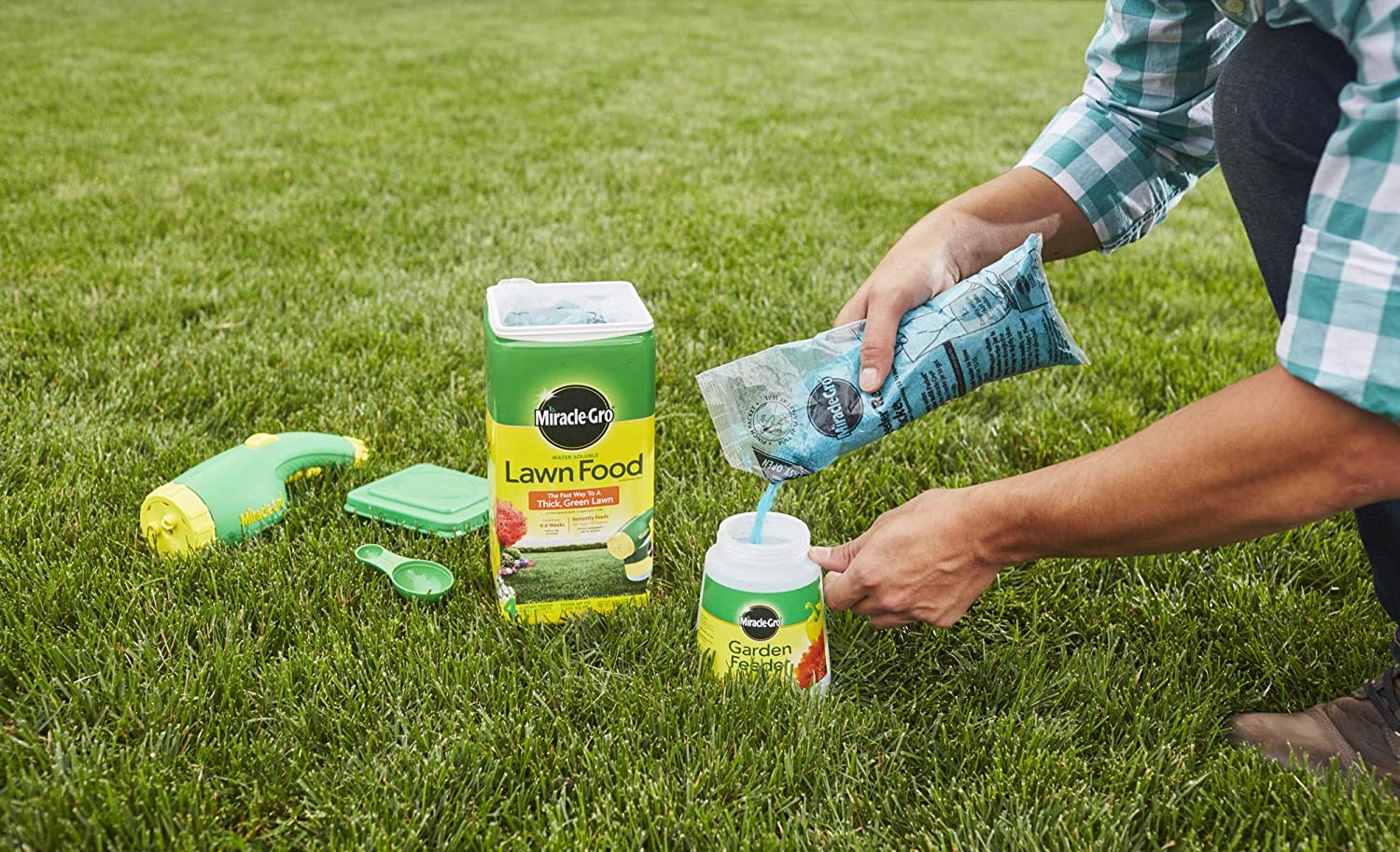
Fertilizers for Bermuda Grass Comparison Chart
| Product Name | NPK Ratio | Quantity | Coverage |
| Scotts Southern Turf Builder Lawn Food | 32-0-10 | 14.06, 28.12, or 42.18 pounds | 5,000, 10,000, or 15,000 square feet |
| Miracle-Gro Water Soluble Lawn Food | 30-0-6 | 5 pounds | 7,200 square feet |
| Jonathan Green Organic Lawn Food | 10-0-1 | 17 or 51 pounds | 5,000 or 10,000 square feet |
| Simple Lawn Solutions Energizer Micronutrient Blend | 6-0-0 | 32 ounces | 3,200 square feet |
| Simple Lawn Solutions High Nitrogen Lawn Food | 28-0-0 | 32 ounces | 3,200 square feet |
| Scotts Green Max Lawn Food | 27-0-2 | 16.67 or 33.33 pounds | 5,000 or 10,000 square feet |
| Scotts Turf Builder Lawn Food | 32-0-4 | 12.5 or 37.5 pounds | 5,000 or 15,000 square feet |
Our Top Picks
Without the proper fertilizer or weed and feed for Bermuda grass, your lawn may look sickly and sparse. Each of the following fertilizers provides the nutrients Bermuda lawns need, enhancing color uniformity and promoting a thick, dense turf.
Best Overall
Scotts Southern Turf Builder Lawn Food
See ItWhat We Like
- Feeds for up to 8 weeks
- 3 sizes for various property needs
- Helps lawns absorb water and nutrients
What We Don’t Like
- Can’t be used within 1 month of first frost
Specs
- NPK ratio: 32-0-10
- Quantity: 14.06, 28.12, or 42.18 pounds
- Coverage: 5,000, 10,000, or 15,000 square feet
The Scotts Southern Turf Builder lawn food is specifically designed for warm-season grasses like Bermuda grass. Its 32-0-10 NPK ratio provides an ample dose of nitrogen to promote lush, green growth while also supplying a good amount of potassium for enhanced drought and heat tolerance. Though this is our top pick for Bermuda lawn maintenance, it’s safe for use on all grass types and can also be applied while lawns are wet or dry. When used as directed, you can walk on it immediately after application, making it a smart choice for families and pet owners.
This Bermuda grass care product uses Scotts’ All-in-One Particles technology to build strong, deep roots that can withstand challenging conditions. We also really like that it comes in three sizes yet only requires application every 6 to 8 weeks. Depending on the size of your yard, you may only need one bag. Though watering is not required after application, Scotts says light watering will help it act faster.
Get the Scotts Southern fertilizer for Bermuda grass at Lowe’s, The Home Depot, Walmart, or Scotts.
Best Bang for the Buck
Miracle-Gro Water Soluble Lawn Food
See ItWhat We Like
- Dissolves easily when used with a Garden Feeder
- Feeds up to 7,200 square feet of Bermuda grass
- Starts feeding instantly for quick results
What We Don’t Like
- Ideal application method requires additional purchase
Specs
- NPK ratio: 36-0-6
- Quantity: 5 pounds
- Coverage: 7,200 square feet
Miracle-Gro’s water-soluble lawn food is a fast-acting fertilizer with an NPK ratio of 36-0-6 designed to promote a lush lawn. Its high concentration of nitrogen plus added iron help grass develop a gorgeous green color within days of application. This Miracle-Gro fertilizer is safe for use on both warm- and cool-season grasses and is easy to apply with the aid of the brand’s hose-end garden feeder (sold separately)—simply fill the dispenser with the water-soluble granules, attach a garden hose, and spray the lawn in a uniform pattern. When applied in this way, a 5-pound container can feed lawns up to 7,200 square feet.
Miracle-Gro recommends using this product for Bermuda grass lawn care every 4 to 6 weeks during the growing season. The quick-release formula provides a rapid nutrient boost, making it ideal for lawns in poor condition.
Get the Miracle-Gro fertilizer for Bermuda grass at Amazon, Ace Hardware, Walmart, or Miracle-Gro.
Best Organic
Jonathan Green Organic Lawn Food
See ItWhat We Like
- Safe to walk on immediately
- Works for up to 10 weeks
- Overapplication doesn’t cause turf burn
What We Don’t Like
- Needs to be applied when lawn is dry and recently mowed
Specs
- NPK ratio: 10-0-1
- Quantity: 17 or 51 pounds
- Coverage: 5,000 or 15,000 square feet
Jonathan Green’s organic lawn food is a granular fertilizer for Bermuda grass made from a mix of plant and animal proteins like feather meal, soybean meal, molasses, and wheat middlings. Its 10-0-1 NPK slow-release formula provides a steady delivery of nitrogen as well as supplemental iron to keep grass green and lush for up to 10 weeks.
This organic fertilizer is safe for kids and pets to walk on immediately after application, and even when overapplied, it won’t burn your grass. It’s well suited to both cold- and warm-season grasses and can be used in spring, summer, or fall. For best results, the manufacturer suggests distributing it when grass is dry and has been recently mowed. It’s available in either a 17-pound bag covering up to 5,000 square feet or a 51-pound bag that feeds up to 15,000 square feet, making it easy to find the right fit for lawns of all sizes.
Get the Jonathan Green lawn fertilizer for Bermuda grass at Amazon, Walmart, or Johnathan Green.
Best Liquid
Simple Lawn Solutions Energizer Micronutrient Blend
See ItWhat We Like
- Comes with a hose attachment
- Ideal for small to medium lawns
- Easy-to-use liquid solution
What We Don’t Like
- 1 bottle won’t be enough for large lawns
Specs
- NPK ratio: 6-0-0
- Quantity: 32 ounces
- Coverage: 3,200 square feet
The Simple Lawn Solutions lawn energizer has a simple 6-0-0 NPK ratio with added nutrients like sulfur, magnesium, and manganese. This formula helps improve soil composition and supports enzyme production, protein synthesis, and nutrient absorption for a healthy, thick lawn. It’s also enhanced with iron, helping grass produce chlorophyll to create an intensely green hue.
Since this is a liquid pick, its uptake into grass roots and blades is relatively quick, so you should notice results within days of application. Though we chose the 32-ounce size for inclusion in our list, this product is also available in 1- and 2.5-gallon containers—they just don’t come with the convenient spray applicator attached. Since this concentrated product must be diluted, it may be smart to buy the bottle with the applicator first and refill it with more budget-friendly bottles for subsequent use. The 32-ounce size will treat up to 3,200 square feet, while the 2.5-gallon jug covers up to 32,000 square feet.
Get the Simple Lawn Solutions energizer fertilizer for Bermuda grass at Amazon or Simple Lawn Solutions.
Best Nitrogen Only
Simple Lawn Solutions High Nitrogen Lawn Food
See ItWhat We Like
- Uses a blend of quick- and slow-release nitrogen
- Comes in a ready-to-use sprayer and bigger jugs
- Can be used on all types of grass
What We Don’t Like
- Sprayer bottle has limited coverage
Specs
- NPK ratio: 28-0-0
- Quantity: 32 ounces
- Coverage: 3,200 square feet
If you want immediate greening and lasting results, Simple Lawn Solutions high-nitrogen lawn food is the pick for you. The concentrated liquid has a 28-0-0 NPK ratio with 70 percent quick-release and 30 percent slow-release nitrogen to get Bermuda grass lawns healthy and keep them that way. Like the other Simple Lawn Solutions product on this list, this one is available in a convenient 32-ounce hose-end dispenser jug for easy application over 3,200 square feet of lawn as well as larger bottles that don’t have the sprayer.
This nitrogen-only product is particularly effective for treating nitrogen deficiencies and enhancing lawn thickness. It’s suitable for use on all types of grass and shows results within days. Still, the fact that it comes in a ready-to-spray bottle does bump up the price a bit, so you may want to buy larger refill bottles after your initial purchase to help bring the overall cost down.
Get the Simple Lawn Solutions high-nitrogen fertilizer for Bermuda grass at Amazon, The Home Depot, or Simple Lawn Solutions.
Best Fast-Acting
Scotts Green Max Lawn Food
See ItWhat We Like
- Has added iron for enhanced greening
- Results in just 3 days; works for up to 8 weeks
- Also available in a ready-to-spray liquid formula
What We Don’t Like
- Can cause turf burn if overapplied
Specs
- NPK ratio: 27-0-2
- Quantity: 16.67 or 33.33 pounds
- Coverage: 5,000 or 10,000 square feet
Scotts Green Max lawn food is a dual-action fertilizer that delivers quick greening and thickening for Bermuda grass and all other lawn types. Its 27-0-2 NPK ratio formula also includes 5 percent iron for enhancing greening in just 3 days, and it can be applied in the spring, summer, or fall. You can spread it while grass is wet or dry and walk over it immediately after.
Like all high-nitrogen fertilizers, this pick can cause burn grass if overapplied. For best results, Scotts recommends using it with a broadcast/rotary spreader on a setting of 3¼ to 3¾ or a drop spreader on 7 to 7½. A 16.67-pound bag is enough to cover up to 5,000 square feet, and it’s also available in 33.33-pound packages that feed up to 10,000 square feet.
Get the Scotts Green Max fertilizer for Bermuda grass at Amazon, Lowe’s, Tractor Supply Co., Ace Hardware, Walmart, or Scotts.
Best for New Grass
Scotts Turf Builder Lawn Food
See ItWhat We Like
- Safe for use when seeding
- Promotes root development to prevent future problems
- Compatible with any grass type
What We Don’t Like
- Some reports of increased weed growth
Specs
- NPK ratio: 32-0-4
- Quantity: 12.5 or 37.5 pounds
- Coverage: 5,000 or 15,000 square feet
This Turf Builder lawn food from Scotts is safe to use when seeding and helps build deep roots to encourage quick and vigorous growth. Its high nitrogen content is compatible with all grass types, aiding each in absorbing water and nutrients. By encouraging such strong growth, this pick protects your lawn against future problems.
This granular fertilizer comes in 12.5- and 37.5-pound bags for 5,000 or 15,000 square feet of coverage, respectively. It’s easy to apply using a spreader, and Scotts has setting instructions on the back of the bag. For quick results, the company recommends watering after application, though it’s not necessary. Scotts also says your lawn will look its best if you use this product every 6 to 8 weeks during the growing season.
Get the Scotts Turf Builder fertilizer for Bermuda grass at Amazon, Lowe’s, Tractor Supply Co., Ace Hardware, The Home Depot, Walmart, or Scotts.
Jump to Our Top Picks
How We Chose the Best Fertilizers for Bermuda Grass
To gather our list of top picks for Bermuda grass fertilizer, we drew on our team’s lawn care experience and the advice of a landscaping expert. We identified the most important features to look for first and then found a variety of products that met those criteria.
To ensure compatibility with Bermuda grass specifically, we prioritized fertilizers with high amounts of nitrogen, no phosphorus, and relatively low levels of potassium. We also considered ease of application, including frequency of suggested feedings, and looked for both liquid and granular options as well as synthetic and organic options. Lastly, we prioritized products that come in a range of sizes so shoppers with small and large lawns have plenty of excellent fertilizers to choose from.
What to Consider When Choosing the Best Fertilizer for Bermuda Grass
Reviewing the following considerations prior to making your final fertilizer selection will help ensure you choose the right product for your needs.
Fertilizer Types
Lawn fertilizers come in three main types: liquid, granular, and water-soluble. Each has its benefits and drawbacks.
- Liquid: This type of fertilizer gives Bermuda grass a quick burst of nutrients as the grass absorbs them directly through its foliage, which is the quickest way. However, due to their short-lived effects, they typically require more frequent applications. Liquid lawn fertilizers often come concentrated and require a garden-type pump sprayer or hose-end dispenser for application.
- Granular: Dry granular fertilizers come in tiny pebbles for application with push-type fertilizer spreaders. Some formulations dissolve slowly to release nutrients over time, though some contain a percentage of quick-release nutrients for faster results. Generally speaking, the overall effects of granular fertilizers last longer than those of liquid products, allowing for less frequent applications.
- Water-soluble: Water-soluble fertilizers are small, sand-like bits that dissolve quickly in water. They’re typically used with a hose-end dispenser so lawnkeepers can fertilize and water the grass simultaneously. Because water-soluble fertilizers generally require a hose for application, they’re best for smaller yards.
NPK Ratio
Commercial lawn and yard fertilizers contain premeasured quantities of nitrogen (N), which stimulates leafy green growth; phosphorus (P), which plays a vital role in flower and fruit production; and potassium (K), which boosts overall plant health. These three nutrients are listed on the fertilizer package by weight.
The best fertilizer for Bermuda grass will have an N-P-K ratio high in nitrogen with little or no phosphorus and a small amount of potassium. For example, an NPK ratio of 32-0-10 contains 32 percent nitrogen, no phosphorus, and 10 percent potassium. This is a great ratio for Bermuda grass.
Organic vs. Synthetic
Most lawn fertilizers contain synthetic ingredients, but the demand for organic fertilizers made of natural ingredients is increasing.
- Organic: Natural lawn fertilizers contain various blends of nonchemical nutrients, such as poultry manure, compost, livestock manure, and earthworm castings. They often cost more because the ingredients require more work to collect, treat, and turn into fertilizer. Most organic lawn fertilizers come in granule form and don’t cause harm to plants or aquatic life if they drain into waterways.
- Synthetic: Formulated in a lab with chemicals or artificial versions of natural ingredients, synthetic fertilizers contain concentrated nutrients, such as potassium, phosphorus, and nitrogen. Some brands contain other minerals, including calcium or boron, to increase soil health. Excess chemical runoff from synthetic fertilizers may harm fish if it gets into waterways and ponds.
Application
Many types of Bermuda grass require fertilizing only once or twice per growing season to reach their full potential, but some of the new hybrid forms of Bermuda grass, such as Midway, Tifway, or Tifgreen, benefit from more frequent applications.
The first fertilizer application of the year should be after late spring or early summer once the grass is fully green. At this time, growers can apply an all-purpose lawn fertilizer with a high ratio of nitrogen according to the instructions on the package. If you intend to overseed with more Bermuda grass seed, wait 2 weeks after fertilizing.
Depending on the product you’re using, you may need to apply a second round of fertilizer in midsummer and a third in the fall. You may want to use a lawn fertilizer containing a higher level of potassium for the fall application, as this will help with disease resistance and root strength for Bermuda grass in winter.
For the best long-term results, consider having the soil tested for deficiencies and add additional nutrients as needed. In most communities, growers can take soil samples to their local County Extension Agency for a comprehensive soil test and nutrient recommendations.
FAQs
Though you probably aren’t still asking, “What is Bermuda grass?” you may still have questions about fertilizing this type of grass. Read on for answers to the most commonly asked questions about the best fertilizers for Bermuda grass.
It depends on the fertilizer’s potency and whether it’s a quick- or slow-release formula. In general, Bermuda grass needs fertilizer every 4 to 6 weeks.
The best time to fertilize a lawn of Bermuda grass is late spring once it’s fully green. Reapply fertilizer in midsummer and fall or more often depending on the fertilizer’s strength.
Use a pump-type sprayer or a hose-end sprayer to apply liquid fertilizer and a push-spreader for granular fertilizers. Be sure to follow the instructions on the package to avoid overapplication that causes fertilizer burn.
In most cases, yes—though it is best to wait after heavy rain when water is still running off the lawn because the fertilizer could wash away.
Most granular fertilizers can remain on the lawn for a couple of days before watering, but check the instructions to be sure.
We spoke to Scott Seargeant, an award-winning International Consulting Arborist and owner of Seargeant Landscape & Arboriculture, about whether it’s better to mulch or bag Bermuda grass clippings. He said, “Mulching Bermuda grass is better than bagging it. The clippings will break down and return some of the elements back into the ground where the grass can use them again.”
Yes, you can overfertilize Bermuda grass, in fact, overfertilization is one of the fertilizer mistakes most people make.
We also asked landscape contractor Scott Seargeant this question, and he gave the following advice: “Mowing Bermuda grass at a lower height of about 1 inch will cause it to grow more horizontally. Adding a moderate amount of fertilizer will increase growth. This should be done in warm to hot weather.”
